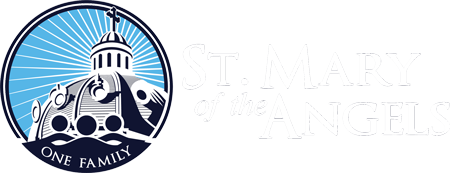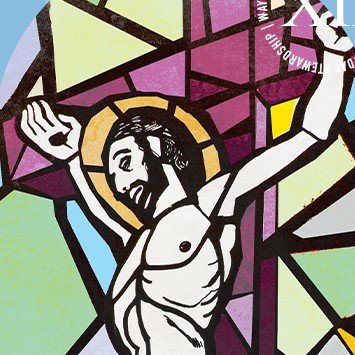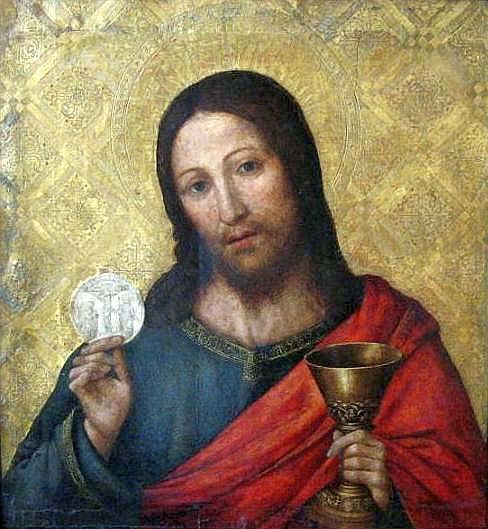No one may share the Eucharist with us unless he believes that what we teach is true, unless he is washed in the regenerating waters of baptism for the remission of his sins, and unless he lives in accordance with the principles given us by Christ.
We do not consume the Eucharistic bread and wine as if it were ordinary food and drink, for we have been taught that as Jesus Christ our Savior became a man of flesh and blood by the power of the Word of God, so also the food that our flesh and blood assimilates for its nourishment becomes the flesh and blood of the incarnate Jesus by the power of his own words contained in the prayer of thanksgiving.
The apostles, in their recollections, which are called gospels, handed down to us what Jesus commanded them to do. They tell us that he took bread, gave thanks and said: Do this in memory of me. This is my body. In the same way he took the cup, he gave thanks and said: This is my blood. The Lord gave this command to them alone. Ever since then we have constantly reminded one another of these things. The rich among us help the poor and we are always united. For all that we receive we praise the Creator of the universe through his Son Jesus Christ and through the Holy Spirit.
On Sunday we have a common assembly of all our members, whether they live in the city or the outlying districts. The recollections of the apostles or the writings of the prophets are read, as long as there is time. When the reader has finished, the president of the assembly speaks to us; he urges everyone to imitate the examples of virtue we have heard in the readings. Then we all stand up together and pray.
On the conclusion of our prayer, bread and wine and water are brought forward. The president offers prayers and gives thanks to the best of his ability, and the people give assent by saying, “Amen.” The Eucharist is distributed, everyone present communicates, and the deacons take it to those who are absent.
The wealthy, if they wish, may make a contribution, and they themselves decide the amount. The collection is placed in the custody of the president, who uses it to help the orphans and widows and all who for any reason are in distress, whether because they are sick, in prison, or away from home. In a word, he takes care of all who are in need.
We hold our common assembly on Sunday because it is the first day of the week, the day on which God put darkness and chaos to flight and created the world, and because on that same day our savior Jesus Christ rose from the dead. For he was crucified on Friday and on Sunday he appeared to his apostles and disciples and taught them the things that we have passed on for your consideration.
St. Justin Martyr
First apology in defense of the Christians
Written in the year 155 A.D.
De la Apología primera de san Justino, mártir, en favor de los cristianos
(Cap. 66-67: PG 6, 427-431)
LA CELEBRACIÓN DE LA EUCARISTÍA
Sólo pueden participar de la eucaristía los que admiten como verdaderas nuestras enseñanzas, han sido lavados en el baño de regeneración y del perdón de los pecados y viven tal como Cristo nos enseñó.
Porque el pan y la bebida que tomamos no los recibimos como pan y bebida corrientes, sino que así como Jesucristo, nuestro salvador, se encarnó por la acción del Verbo de Dios y tuvo carne y sangre por nuestra salvación, así también se nos ha enseñado que aquel alimento sobre el cual se ha pronunciado la acción de gracias, usando de la plegaria que contiene sus mismas palabras, y del cual, después de transformado, se nutre nuestra sangre y nuestra carne es la carne y la sangre de Jesús, el Hijo de Dios encarnado.
Los apóstoles, en efecto, en sus comentarios llamados Evangelios, nos enseñan que así lo mandó Jesús, ya que él, tomando pan y habiendo pronunciado la acción de gracias, dijo: Haced esto en memoria mía; éste es mi cuerpo; del mismo modo, tomando el cáliz y habiendo pronunciado la acción de gracias, dijo: Ésta es mi sangre, y se lo entregó a ellos solos. A partir de entonces, nosotros celebramos siempre el recuerdo de estas cosas; y, además, los que tenemos alguna posesión socorremos a todos los necesitados, y así estamos siempre unidos. Y por todas las cosas de las cuales nos alimentamos alabamos al Creador de todo, por medio de su Hijo Jesucristo y del Espíritu Santo.
Y, el día llamado del sol, nos reunimos en un mismo lugar, tanto los que habitamos en las ciudades como en los campos, y se leen los comentarios de los apóstoles o los escritos de los profetas, en la medida que el tiempo lo permite.
Después, cuando ha acabado el lector, el que preside exhorta y amonesta con sus palabras a la imitación de tan preclaros ejemplos.
Luego nos ponemos todos de pie y elevamos nuestras preces; y, como ya hemos dicho, cuando hemos terminado las preces, se trae pan, vino y agua; entonces el que preside eleva, fervientemente, oraciones y acciones de gracias, y el pueblo aclama: Amén. Seguidamente tiene lugar la distribución y comunicación, a cada uno de los presentes, de los dones sobre los cuales se ha pronunciado la acción de gracias, y los diáconos los llevan a los ausentes.
Los que poseen bienes en abundancia, y desean ayudar a los demás, dan, según su voluntad, lo que les parece bien, y lo que se recoge se pone a disposición del que preside, para que socorra a los huérfanos y a las viudas y a todos los que, por enfermedad u otra causa cualquiera, se hallan en necesidad, como también a los que están encarcelados y a los viajeros de paso entre nosotros: en una palabra, se ocupa de atender a todos los necesitados.
Nos reunimos precisamente el día del sol, porque éste es el primer día de la creación, cuando Dios empezó a obrar sobre las tinieblas y la materia, y también porque es el día en que Jesucristo, nuestro salvador, resucitó de entre los muertos. Lo crucificaron, en efecto, la vigilia del día de Saturno, y a la mañana siguiente de ese día, es decir, en el día del sol, fue visto por sus apóstoles y discípulos, a quienes enseñó estas mismas cosas que hemos puesto a vuestra consideración.



